Black History Month 2023 Salute: Celebrating New Mount Zion Baptist Church of Dallas, Texas, Inc.2/11/2023 Quick Facts |
My journalism professor, mentor, and guiding light, Dr. Charlie Marler, died May 27, 2022, and I plan to write a series of blog posts about the impact he had on my and his other former students’ journalism and media careers. |
First Post: Shock and Grief, May 31, 2022
When I stepped out of a Greyhound bus in Abilene, Texas, in 1979, I was determined to earn a bachelor’s degree and become a broadcast journalist. I had no idea that one of my Abilene Christian University journalism professors would influence and redirect my career in the remarkable ways that the late Dr. Charlie Marler did. The long trip from my native Memphis, Tennessee, was a time of celebration and joy for numerous reasons. I was the first in my family to enroll in college. My family helped me pack all our hopes and dreams in the borrowed suitcases donated by my former junior high school guidance counselor, Viola O’Neil Cole, and Peggy and Geno Grandi. The Grandis gave me a part-time job during high school cleaning their East Memphis house. I had a scholarship from the Delta Sigma Theta Sorority and the blessings and prayers of my beloved parents, Rowena H. Whiting, and Prince Whiting Jr. Moreover, the Tennessee to Texas bus trip was important to the community, including members of the Southside Church of Christ, and Mary and Myron Lowery, among many others. I knew a lot of people wanted me to succeed and I planned to accomplish just that.
Marler was my Communication Law professor and at that time, chair of ACU’s Department of Journalism and Mass Communication. Before I graduated in 1983, I had landed a part-time job working in TV news at KRBC, which was Abilene’s NBC affiliate at that time. Further, I had already sold a story to CNN, which was pretty amazing for a greenhorn still in college. After graduation, I left Abilene to pursue new jobs in other states and returned a decade later to be honored with the Gutenberg Award. As time pressed forward, I kept in touch with Marler, and he shared some of the projects he was working on. Peggy Marler, his wife, always answered the phone with a kind voice and then said: “Here’s Charlie” and handed him the phone. Marler and I had long phone conversations about media-related topics, and he was always interested in my career and encouraged me.
In 2019, we had an extended conversation about being multimedia specialists, which we both were. In December 2020, he basically ordered me to go back to school to become a historian, after I told him about my just-published Texas Highways magazine stories. I followed orders and he wrote recommendation letters to support my graduate history applications.
Long-time Abilene friend, Susan Perry, alerted me May 25, 2022, that Marler was in ICU. I spoke with Peggy, and she updated me that he had had a stroke. I was sick with fear and asked her to please keep me informed. I prayed. She alerted me on May 27 via a text message that he had died. I was overcome with grief that day and inconsolable when I saw his picture on an Abilene funeral home’s website.
I am coping with my grief by writing and rereading his graduate history recommendation letters. I just completed 12 graduate hours on a part-time basis at the University of Texas at Arlington, thanks to two fantastic scholarships from UTA Professor Emeritus and Association for the Study of African American Life and History (ASALH) President Dr. W. Marvin Dulaney. Further, I was accepted into the doctorate program at the University of North Texas. Marler knew of my progress and that I planned to start the doctorate, pending the best financial aid support I can receive, this fall. I am so glad I quickly followed his orders because he predicted I could leverage my journalism expertise as he did and make a significant contribution. I plan to specialize in African American history in Texas.
Marler went above and beyond by making himself available to me and his other former students. He rejected the traditional patriarchal mindset of his generation and saw each student as capable of achieving more, and more, and more. He practiced what he preached by conducting scholarly research and continuing to write to the end of his life.
And lastly, he cared!
Please leave your comments to these questions: How did Dr. Marler impact your career and life? Have you ever experienced the death of a mentor? How did you cope?
From Journalism to African American History in Texas
Download my map quiz here.
I listened and am almost finished with my first semester. Returning to graduate school was definitely the right step. The courses are intellectually satisfying and I am well-suited to part-time graduate work.
Watch video of Dr. Marler discussing libel.
Narrative: The heart of history and journalism
One of the reasons Dr. Marler advised me to consider graduate work in history is because he had studied "journalism and Black history at the University of Missouri-Columbia," which he wrote about in my recommendation letter. I was so impressed that he had studied Black history in graduate school. He also shared that well-known axiom, "Journalism is the first rough draft of history."
When I graduated with my M.A. in Journalism Administration degree from the University of Memphis, I sensed I would return to a university to learn more about the art and craft of the narrative. This time, I am aiming for a doctorate in history because of the abundant overlooked, underreported, and forgotten African American history in Texas content yet to be discovered, researched, and published. I look forward to one day researching, writing and teaching that history on all platforms, in and outside of academia. Meanwhile, I keep helping organizations and clients tell important stories while enjoying a new take on a familiar ride.
Read my other UTA graduate school recommendations:
- Dr. Lewis V. Baldwin
- Matt Joyce
- Dr. Dan Lattimore
- Listen to Dr. Leonard Moore, who is the author of "Teaching Black History to White People" and also the George Littlefield Professor of American History at UT-Austin, speaking on KERA Radio 11.08.21.
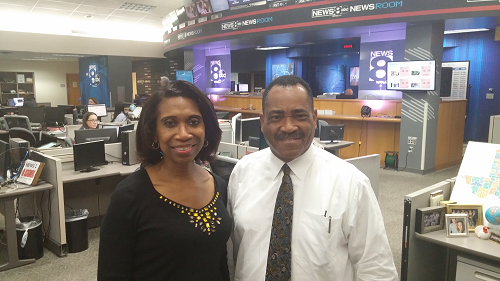 Thankful for the opportunity to work with a great journalist and leader, John McCaa, during the Dallas police ambush coverage. Photo taken in August 2016.
Thankful for the opportunity to work with a great journalist and leader, John McCaa, during the Dallas police ambush coverage. Photo taken in August 2016. I had the privilege of working with McCaa during a series of contract gigs at Channel 8 that involved the assignment desk. The best description of what working on the assignment desk is comes from one of my esteemed Abilene Christian University journalism professors, Dr. Charles Marler—it’s “like an octopus.” For example, the Desk:
• Manages day-to-day and breaking news assignments for TV news crews.
• Navigates Twitter and Facebook for updates.
• Vets information across a host of databases.
• Provides research support by phone.
My most-memorable-McCaa moment was during WFAA’s coverage of the Dallas police ambush in the summer of 2016. This tragic event brought the newsroom to a collective heartfelt loss, for all those who were killed and injured. There were other emotions that elevated us: admiration and respect for the videographers and reporters who were on the scene that fateful day, July 7, 2016. In the midst of handling logistics, gathering details of funeral arrangements and verifying other information for producers, I witnessed McCaa’s calm leadership during our team briefings.
Having worked in journalism for a variety of news organizations such as: KRBC-TV in Abilene, WPTY-TV, WLOK and WGKX radio stations in Memphis, FayObserver.com in Fayetteville, North Carolina, as well as The Associated Press in Jackson, Mississippi, and Dallas, (not to mention a wealth of freelance gigs), by far the Dallas police ambush story was the toughest to cover.
McCaa brought experience gained from other challenging assignments in his long career to this tragic event in Dallas.
He writes that retiring from television news after more than 42 years is “not easy.” However, he sensed that God “decided it was time” and he’s being obedient.
I am thrilled that my career dovetailed with his and that I gained so much from being in the newsroom during his tenure. His TV news experience, his depth of knowledge and his caring spirit elevated the environment and the newscast. Every time.
Thank you for your service. #ThanksJohn
(c) March 2019 Harvest Reapers Communications. All Rights Reserved.
|
|
About the Author:
Regina L. Burns, M.A., Project+, is an award-winning multimedia editor and journalist, specializing in Black history and African American stories at Harvest Reapers Communications. Her work has been published in Texas Highways magazine, WFAA-TV, The Dallas Morning News, the Fort Worth Star-Telegram as well as The Commercial Appeal, the Tri-State Defender and The Flyer, among others.
She previously worked for a variety of news media organizations as an editor and journalist, including The Associated Press in Mississippi and Texas. She was news director at WLOK-AM and WGKX KIX-106 FM in Memphis. Learn more
Categories
All
1960s
1964 Nobel Peace Prize
1964 Republican National Convention
1968 King Assassination
1994 940 Volvo
2007 Pulitzer Prize In History
2012
2013
2018 Women's History Month Salute
2019 Women's History Month
2023 Women's History Month
4 Ideas To Support 'Motherless' Friends On Mother's Day
5 Things You Can Do NOW To Build Search Engine Optimization
AAUW
Abilene
Abilene Christian University
Abolitionist
ACU
ACU Library
Advanced Placement English
Advice Interactive Group
African American
African-american
African-American
African American History
African-American History
African American Museum
African American Women
African-American Women
Alabama
Alamo
Alice Randall
Alice Walker
Alvin Ailey
America
Ampere
Amzie Moore
Analytics
Anna Murray
Ann Arbor
Annie White
A.P. English
App
Appetite
Apps
Aretha Franklin
Asia Rodgers
Athens
AT&T
"At The River I Stand
"attitude Of Gratitude"
Audacity
Back To School
Barbara Kelly
Barbers
Belva Davis
Bernadette Coleman
Big Data
Bill Hogg
Bird
Bird Sounds
Birmingham
Birthday
Bishop T.D. Jakes
Black Enterprise
Black Hair Styles
Black Historian
Black History
Black History Month
Black History Month 2014
Black Journalists
Black Women
Bob Yates
Book
Bowling
Breaking News
Breast Cancer
Brenda Ellis
Broadcast
Brookhaven College
Brooklyn Calloway
Butter Cake
California
Cancer
Career
Carlos Baute
Cary Fagan
Cbs
Cedar Hill
Celina
Cell Phone Video
Central High School
Channel 8
Charles Whitman
Cheryl Smith
Children
Chris Bradshaw
Church Bombing
Cicely Tyson
Circle R Ranch
Civil Rights
Civil Rights Movement
Civil Rights Pilgrimage
Clients
Clothes
Cloudbaseda0f2d66592
Communication Management
Communications
Communication Skills
Conde Nast64813fceb0
Connecticut
Connecting On Social Media
Connections
Connie Dyson
Consulting
Content
Content Marketing
Cookbook
Copy Editing
Cotton Patch Cafe
Cousin Kenny
Crisco
CSI: Miami
C-SPAN
Customer Experience
Customer Service
Customer Testimonial
D
Dale Carnegie
Dallas
Dallas Advertising League
Dallas County Democratic Party
Dallas Interactive Marketing & Internet SEO/SEM Meetup
Dallas Library Branch
Dallas Public Library
Darlene Ewing
Dart Center For Journalism & Trauma
David Alan Grier
David Leeson
David Meerman Scott
D.C.
"Delta Epiphany: Robert F. Kennedy In Mississippi"
Delta Sigma Theta Sorority
Denise Mcnair
Detroit
DFW
Digital Audio
Doctor
Doctorate Degree
Dog
Don Rossi
Don't Believe The Hype Celebrity Bowl-a-thon
Dorothy Jones
Dr. Charlie Marler
Dr. Cheryl Mann Bacon
Dr. Dennis Kimbro
Dr. Kathleen Wickham
Dr. King
Dr. King's Legacy
Dr. Lewis Baldwin
Dr. Martin L. King Jr.
Dr. Mary Crawford
Dr. Michael Williams
Dr. Sam Haynes
Dr. Tommy L. Brown
Dr. William Dulaney
Dr. W. Marvin Dulaney
Editing
Education As A Civil Right
Edward Snowden
Edward Welch Jr.
Ellen Meacham
Emerson Able
Emily West
"Empire"
English Teacher
Erick Soderstorm
Eric Swayne
Ernest J. Gaines
Espanole92bbe0581
Eudora Welty
Facebook
Fallen Soldiers
Fannie Lou Hamer
Fcc
First Lady Ruth "Nell" Brown
First Responder
First Responder Support Network
Food Stamps
Former Memphis Mayor Henry Loeb
Former Slave
Fort Worth
Foster Dog
Fourth Of July
Fourth Of July And Social Media
Frederick Douglass
Freelancers
Gabby
Gartner
Gates Foundation
Gene Roberts
Golinharris
Gratitude
Greek
Greyhound Bus
Grief
GriefShare
Guinness World Records
Gutenberg
Gutenberg Award
Hank Klibanoff
Happy Birthday
Harper Watters
Hathaway
Helen Pitts
Hendrick Arnold
Henry Miller Morgan
Hershey Bar
Hidden Black History
Hidden History
High School Football
Historian
Historiography
H. M. Morgan
Hog
Houston
Houston Ballet
Html5
Humboldt
Husband
Hyatt Regency Dallas
Immigration Attorney
Immigration Reform
Inc. Magazine
In Loving Memory Of My Mom
Innovative
Innovators
Internet Marketing Agency
Ipad
Irving
"I’ve Been To The Mountaintop"
Jackson
Jackson State University
Jacqueline
Jacqueline Madden
Jacqueline Wald
Jc Penney
Jewel Brodie
Jim Moroney
JMC
" Joan Beifuss
John Glenn
John McCaa
Journalism
Journalism And Project Management
Journalists
Katheryn Stockett
K.D. Paine
Kennedy-Curry Middle School
Kenny DeWalt
Kera
Kimberly Bryant
King Memorial
Komen Dallas Race For The Cure®
KRBC TV
KRBC-TV
Kurl Mckinney
Kyle Whitfield
Lakewood Church
Larry Payne
Learning Spanish Through Music
Ledisi
Lessons
Lessons Learned
Library Card
Library Of Congress
Life Coach
Lillian Barnett
Lincoln Junior High School
Lisa N. Alexander
Lissa Duty
Literature
Living Will
Louisiana
Lovers Lane United Methodist
Lovey Chin
Lsu
Lynne Thigpen
Lyrics
Ma Dear
Magazine Journalism
Magazine Writing
Mahalia Jackson
Manassas High School
Marcus Buckingham
Margaret Walker Alexander
Marian Wright Edelman
Marilyn Calhoun
Marion Edington
Marshall Mcluhan
Marta Sanchez
Martha Germann
Martin L. King Jr.
Mary And Myron Lowery
Mason Temple
Mass Slayings
Master's Degree
Matt Joyce
Maya Angelou
Medgar Evers
Medgar Evers: Mississippi Martyr
Media
Media Professional
Media Relations
Meetup
Melinda Guravich
M. Elizabeth Cedillo-Pereira
Memorial Day
Memphis
Memphis Businessman Abe Plough
Memphis Music
Memphis Sanitation Strike
Men Of Change
Mentor
Metrics
Michael Hamtil
Michael White
Michelle Obama
Michigan
Mildred Taylor
Millicent Hoskin
Mindee Zack
Mississippi
Mississippi Delta
Mississippi State
Mitchell Gold + Bob Williams
MLK
Mom
Moneymaking Machine
Mother
Motherless Mother's Day
Mother's Day
Mp3
Mrs. Dodie Osteen
Mrs. Edington
Mrs. Rowena Whiting
Mrs. Whiting
M.T. Reilly Elementary School
Music
Music Videos
My Mom
Myron Lowery
Naacp
NAACP Youth Council
NABJ
Narrative
Nasa
Nate Silver
National Association Of Black Journalists
National Civil Rights Museum
Newberry Medal
New Horizons
New Media
New Mount Zion Baptist Church
Newsengin
Newspapers
News Release
Niche
Norma Adams-Wade
Npr
Nursing Home
Obama
Office Collaboration Tools
Ole Miss
Olympian Gabby Douglas
Olympus Digital Recorder
Open Source
Oprah Book Club
Osama Bin Laden
Oscar Pereira
Pan Awsumb
Park Place Volvo
Paula Casey
Paul Golden
Peggy Marler
Personal Mission Statement
Pet
Peter Edelman
Peter Hall
Pharyngitis
Ph.D.
Photojournalism
Phyllis Bailey
PMP
Positive Mental Framework For Success
Post-traumatic Stress Disorder
PR
Prayer
President Obama
Press Club Of Dallas
Press Release
Project Management
Project Manager
Proven Consultant
Ptsd
Public Relations Writing
Pulitzer-Prize
Quaker
Queen Of Soul
Rachel Shankman
Reach For The Stars
Regina L. Burns
Rehabilitation Center
Relationships
#Remember
Reposition Yourself
Research
Research Archive
Resume Video
Retailer
Rev. Al Green
Rev. Billy Kyles
Rev. Dr. Thomas Hudspeth
Rev. Earnest Freeman
Rev. James Lawson
Rev. Joel Osteen
Rev. Martin Luther King Jr.
Rev. Paula White
Richard Howorth
Richardson Humane Society
Richard Wright
Richland College
Richmund Punch
Rocks Digital
Ron Hadfield
Rose Braziel
Ruby Anik
Ruby Dee
Russ Mitchell
Sales
Samsung Telecommunications America
Sanitation Workers
Scholarship
Scott H. Cyton
Secret
"Selma"
Sen. Joseph Clark
Sen. Robert Kennedy
SEO
Shama Hyder Kabani
Sharepoint
Sharon Matlock
Shih Tzu
Sick
Singing Dog
Sixteenth Street Baptist Church Bombing
Small Business Saturday
Smithsonian Institution
Smu
SNAP
Social Media
Social Media And Spanish
Social Media For Project Managers
Social Media Marketing
Social Media Trends 2013
Social Media Writing
Southern
Southern Literary Trail
Southern Writers
Spanish
Spanish Language
Spectrum
Sportsdayhs
Stakeholder Communications
Stakeholder Engagement
Stephen Covey
Steve Abel
Strategic Advantage
Students
Studying Spanish
Success
Susan Perry
SyTanna Freeman
Technology
Ted Ownby
Television Journalism
Television News
Tenn.
Tennessee
Texas
Texas Dog
Texas Highways
Texas Highways Magazine
Texas Revolution
Thankful
Thanksgiving
Thanksgiving 2012
Thanksgiving Prayer
The Association Of Magazine Media
The Bar-Kays
The Dalai Lama
The Dallas Morning News
The Potter's House
The Press And Civil Rights
The Race Beat
The Zen Of Social Media Marketing
Thou Art Loosed Conference
Tim Haydin
Tom Mccracken
Tracey Ferguson
Travel
Travel Journalism
Travel Reporting
Treasured
Trends
Turkey And Dressing
Turkey Trot
Tweetdeck
Tweetup
Twitter
Twitter And Spanish
TX
Tyler
Tyler Barber College Chain
Underemplyed
Unemployed
Unita Blackwell
University Of Missouri-Columbia
UNT
Usa Today
UTA
Vanderbilt
Veterans
Video
Video Conversion Software
Videographer
Viola Cole
Viola O'Neil Cole
Virtual Machine
Volvo
Walking Partners
Washington
Wav
WDIA-AM
Wealth
Weight Watchers
Wendy Calhoun
WFAA
Wikipedia
Will
William Moore
Witi
WLOK
Wma
Woman
Women
Women In Technology International
Women Journalists
Women's History Month
World Wide Rave: Creating Triggers That Get Millions Of People To Spread Your Ideas And Share Your Stories
Wrapping Black Hair
Writing
Writing Your Goals
WW App
Yahoo! Eye Tracking Study
Yoda
Youtube
Zora Neale Hurston
Archives
January 2024
July 2023
May 2023
March 2023
February 2023
October 2022
June 2022
May 2022
November 2021
August 2021
June 2021
May 2021
January 2021
November 2020
October 2019
March 2019
January 2019
March 2018
June 2017
March 2017
February 2017
January 2017
November 2016
September 2016
August 2016
July 2016
January 2016
November 2015
September 2015
July 2015
June 2015
May 2015
April 2015
March 2015
February 2015
January 2015
December 2014
November 2014
September 2014
August 2014
July 2014
June 2014
May 2014
April 2014
February 2014
January 2014
December 2013
November 2013
September 2013
July 2013
June 2013
May 2013
March 2013
February 2013
January 2013
December 2012
November 2012
October 2012
September 2012
August 2012
July 2012
June 2012
April 2012
March 2012
February 2012
January 2012
December 2011
November 2011
October 2011
September 2011
August 2011
July 2011
May 2011
April 2011
March 2011
February 2011
January 2011

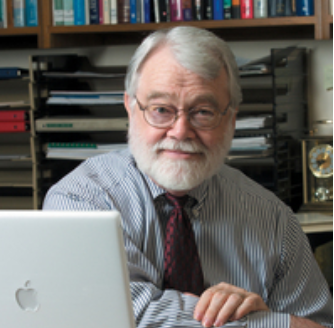
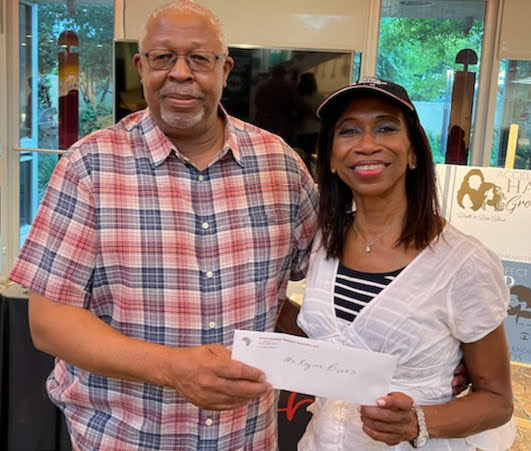
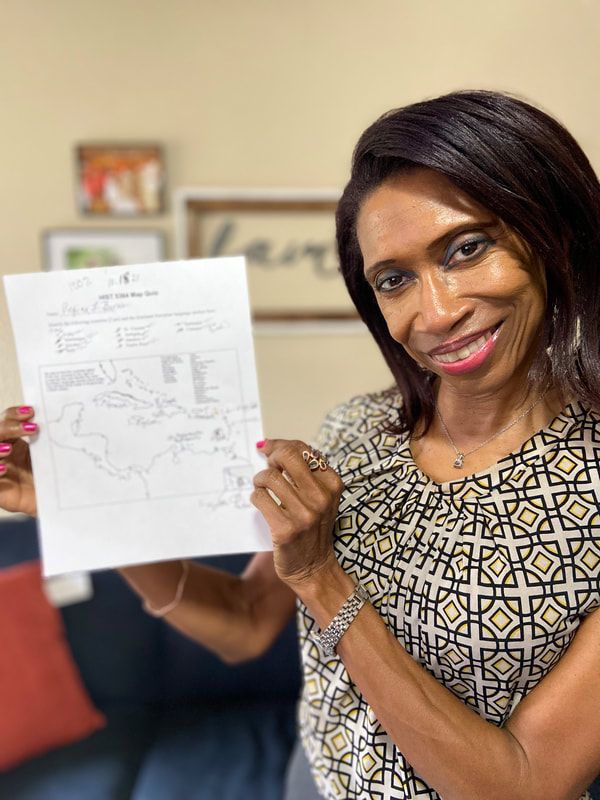
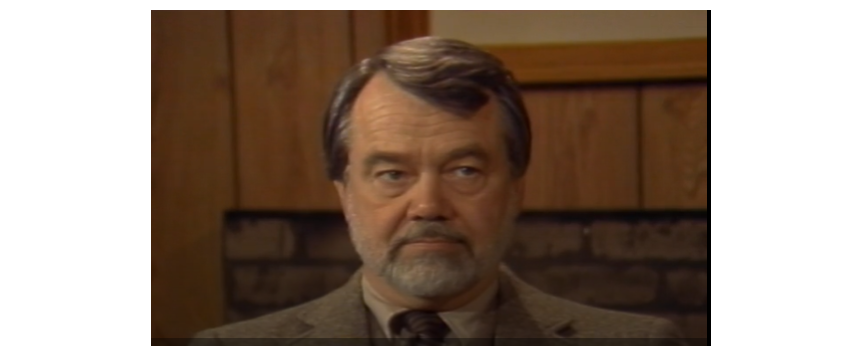


 RSS Feed
RSS Feed